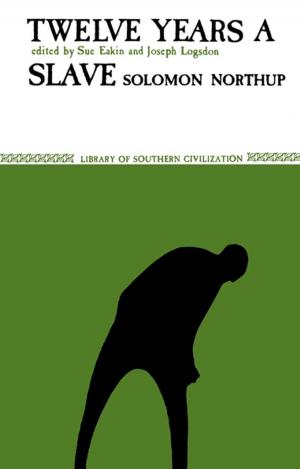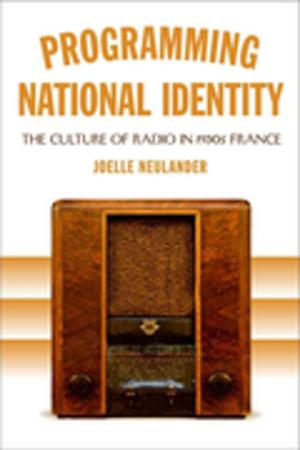Radical Spiritual Motherhood
Autobiography and Empowerment in Nineteenth-Century African American Women
Fiction & Literature, Literary Theory & Criticism, Black, American, Nonfiction, Social & Cultural Studies, Social Science, Gender Studies| Author: | Rosetta R. Haynes | ISBN: | 9780807146934 |
| Publisher: | LSU Press | Publication: | January 1, 2011 |
| Imprint: | LSU Press | Language: | English |
| Author: | Rosetta R. Haynes |
| ISBN: | 9780807146934 |
| Publisher: | LSU Press |
| Publication: | January 1, 2011 |
| Imprint: | LSU Press |
| Language: | English |
In this cutting-edge work, Rosetta R. Haynes explores the spiritual autobiographies of five nineteenth-century female African American itinerant preachers to discover the ways in which they drew upon religion and the material conditions of their lives to fashion powerful personas that enabled them to pursue their missions as divinely appointed religious leaders. Haynes examines the lives and narratives of Jarena Lee (1783--?), Zilpha Elaw (c. 1790--?), Julia Foote (1823--1900), Amanda Berry Smith (1837--1915), and Rebecca Cox Jackson (1795--1871) through an innovative conceptual framework Haynes terms "radical spiritual motherhood" -- an empowering identity deriving from the experience of "sanctification," a kind of spiritual perfection following conversion.
Drawing upon conventional nineteenth-century standards for motherhood, radical spiritual motherhood also challenges traditional standards: These were women whose religious missions authorized them to preach in public, to assume an activist role, and to declare sexual autonomy through celibacy. They redefined their relationships to the powers that be by becoming instruments of God in a kind of protofeminist gesture. Haynes uses historical methods, feminist literary theory, and liberation theology to investigate the ways these women, as reflected especially in their autobiographies, employed the idea of motherhood to fashion strong, authentic identities as women called to preach the gospel.
Though radical spiritual motherhood is an identity specifically adopted by free black women, the lives and texts of these itinerant preachers retain close ties to those of enslaved black women through the negative cultural stereotypes assigned to both groups. To illustrate this connection, Haynes analyzes the writings of the preachers within the context of the narratives of former slaves Harriet Jacobs, Mary Prince, and Sojourner Truth.
Haynes also links the lineage of radical spiritual motherhood to a modern woman by considering Pauli Murray (1910--1985), the first African American woman (and the second African American) to be ordained as an Episcopal priest. By looking at Murray's intellectual and spiritual development, especially her feminist ideologies, social activism, and espousal of liberation theology, Haynes shows that Murray was in fact a modern-day radical spiritual mother.
Pioneering and accessible, Radical Spiritual Motherhood marks a turning point in the study of both African American literature and women's studies.
In this cutting-edge work, Rosetta R. Haynes explores the spiritual autobiographies of five nineteenth-century female African American itinerant preachers to discover the ways in which they drew upon religion and the material conditions of their lives to fashion powerful personas that enabled them to pursue their missions as divinely appointed religious leaders. Haynes examines the lives and narratives of Jarena Lee (1783--?), Zilpha Elaw (c. 1790--?), Julia Foote (1823--1900), Amanda Berry Smith (1837--1915), and Rebecca Cox Jackson (1795--1871) through an innovative conceptual framework Haynes terms "radical spiritual motherhood" -- an empowering identity deriving from the experience of "sanctification," a kind of spiritual perfection following conversion.
Drawing upon conventional nineteenth-century standards for motherhood, radical spiritual motherhood also challenges traditional standards: These were women whose religious missions authorized them to preach in public, to assume an activist role, and to declare sexual autonomy through celibacy. They redefined their relationships to the powers that be by becoming instruments of God in a kind of protofeminist gesture. Haynes uses historical methods, feminist literary theory, and liberation theology to investigate the ways these women, as reflected especially in their autobiographies, employed the idea of motherhood to fashion strong, authentic identities as women called to preach the gospel.
Though radical spiritual motherhood is an identity specifically adopted by free black women, the lives and texts of these itinerant preachers retain close ties to those of enslaved black women through the negative cultural stereotypes assigned to both groups. To illustrate this connection, Haynes analyzes the writings of the preachers within the context of the narratives of former slaves Harriet Jacobs, Mary Prince, and Sojourner Truth.
Haynes also links the lineage of radical spiritual motherhood to a modern woman by considering Pauli Murray (1910--1985), the first African American woman (and the second African American) to be ordained as an Episcopal priest. By looking at Murray's intellectual and spiritual development, especially her feminist ideologies, social activism, and espousal of liberation theology, Haynes shows that Murray was in fact a modern-day radical spiritual mother.
Pioneering and accessible, Radical Spiritual Motherhood marks a turning point in the study of both African American literature and women's studies.















